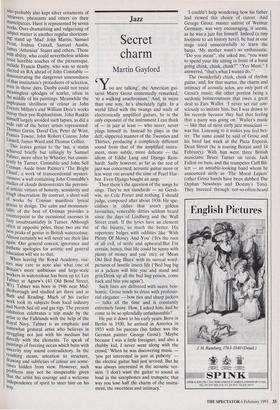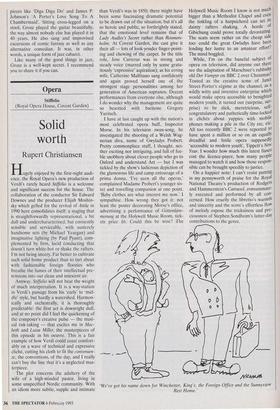Jazz
Secret charm
Martin Gaylord
You are talking', the American gui- tarist Marty Grosz contentedly remarked, `to a walking anachronism.' And, in more than one way, he's absolutely right. In a world filled with the twangs and wails of electronically amplified guitars, he is the only exponent of the instrument I can think of — in jazz at least — who never, never plugs himself in. Instead he plays in the deft, slippered manner of the Twenties and Thirties, producing a completely different sound from that of the amplified instru- ment, more subtle, more delicate — the idiom of Eddie Lang and Django Rein- hardt. Sadly however, as far as the rest of jazz was concerned, acoustic guitar more or less went out around the time of Pearl Har- bor. Even Django bought an amp.
Then there's the question of the songs he sings. They're not standards — no Gersh- win, no Cole Porter and nothing, I should judge, composed after about 1938. He spe- cialises in oldies that aren't golden favourites, venerable ditties seldom heard since the days of Lindberg and the Wall Street crash. If the lyrics have an element of the bizarre, so much the better. His repertoire bulges with oddities like 'With Plenty Of Money And You' (`It's the root of all evil, of strife and upheaval/But I'm certain, honey, that life could be sunny with plenty of money and you' etc); or 'Mean Old Bed Bug Blues' with its surreal word- pictures of hostile insect life (Ted bug big as a jackass will bite you and stand and grin/Drink up all the bed bug poison, come back and bite you again').
Such lines are delivered with suave bon- homie. Grosz tends to dress with professo- rial elegance — bow ties and sharp jackets — talks all the time and is constantly extremely funny. How, I asked him, had he come to be so splendidly unfashionable?
He put it down to his early years. Born in Berlin in 1930, he arrived in America in 1933 with his parents (his father was the German painter George Grosz). 'Maybe because I was a little foreigner, and also a chubby kid, I never went along with the crowd.' When he was discovering music 'you get interested in jazz at puberty' the electric guitar had just arrived. But he was always interested in the acoustic ver- sion. 'I don't want the guitar to sound as loud as the saxophones and trumpets; that way you lose half the charm of the instru- ment, the sweetness and intimacy.' I couldn't help wondering how his father had viewed this choice of career. And George Grosz, master satirist of Weimar Germany, was very encouraging, it seems, as he was a jazz fan himself. Indeed (a tiny footnote to art history here), he had at one stage tried unsuccessfully to learn the banjo. 'My mother wasn't so enthusiastic. "Do you mean", she asked me, "you want to spend your life sitting in front of a band going chink, chink, chink?" "Yes Mom," I answered, "that's what I wanna do."' The (wonderful) chink, chink of rhythm guitar, and, for that matter, the charm and intimacy of acoustic solos, are only part of Grosz's music; the other portion being a sardonic boisterousness that owes a great deal to Fats Waller. 'I never set out con- sciously to imitate him, but I was drawn to his records because they had that feeling that a party was going on.' Waller's music — like that of most early jazz musicians was fun. Listening to it makes you feel bet- ter. The same could be said of Grosz and his band last week at the Pizza Express, Dean Street (he is touring Britain until 14 February). With him were three British musicians: Bruce Turner on reeds, Jack Fallon on bass, and the trumpeter Cuff Bil- lett — an amiable-looking band whom he announced airily as 'The Moral Lepers' (other Grosz bands have been dubbed The Orphan Newsboys and Destiny's Tots). They breezed through not-so-often-heard pieces like 'Dip Diga Do' and James P. Johnson's 'A Porter's Love Song To A Chambermaid'. Sitting cross-legged on a stool, Grosz played the guitar beautifully, the way almost nobody else has played it in 40 years. He also sang and improvised excursions of comic fantasy as well as any alternative comedian. It was, in other words, a unique form of jazz cabaret.
Like many of the good things in jazz, Grosz is a well-kept secret. I recommend you to share it if you can.























































 Previous page
Previous page